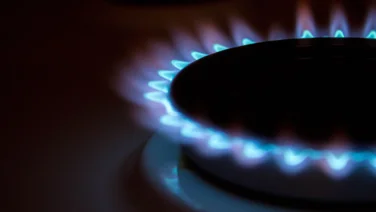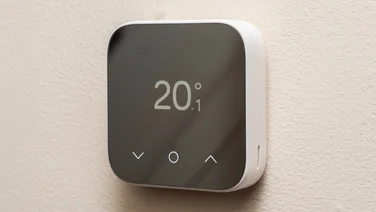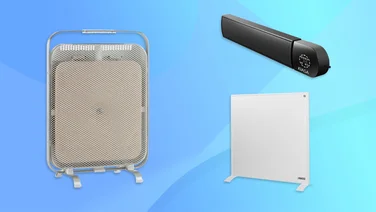To help us provide you with free impartial advice, we may earn a commission if you buy through links on our site. Learn more

Are heat pumps worth it? It certainly seems so: although in the UK there are currently only 564 heat pumps per 100,000 households, a reported 19.3 million have been installed across Europe as of 2023, and countries such as Norway have an impressive one heat pump per 3.4 people.*
It’s easy to see why. Heat pumps are a logical alternative to gas boilers: although the upfront costs can be high, in the long run they will produce fewer carbon emissions and – if they’re running effectively – reduce your household bills.
In this article, we’ll break down the pros and cons of installing an air source heat pump, and provide context as to why we think now is a great time to ditch your boiler. If you’re interested in finding out how much it could cost, try our free quote-finding tool below.
Get a free quote for heat pump installation today
If an air source heat pump is something you’re considering, take our survey to find out how much it could cost you – we’ll then put you in touch with suppliers who match your requirements.Heat pumps are the water-heating appliance that everyone from Greenpeace to the UK government wants you to install on your property.
Installed outside a building, a heat pump uses warmth from the air or ground to increase the temperature of a chemical refrigerant inside the pump. It then heats up that chemical refrigerant even further using electricity, before pumping heated water into your heating system or hot water supply. This process is intended to produce fewer carbon emissions when compared to a fuel-guzzling gas boiler. Plus, it may reduce your household energy bills – but only if the heat pump is working efficiently.
There are two main types of heat pump: air source heat pumps (ASHPs) and ground source heat pumps (GSHPs). Air source heat pumps are installed above ground, and make use of warmth in the air. And as you would expect, ground source heat pumps are installed underground, and they get their thermal energy from the earth.
READ NEXT: Best air source heat pumps
Heat pump pros and cons: Are they worth it?
Pros:
- Heat pumps have the potential to reduce your carbon footprint, by utilising “free” thermal energy
- Installing a heat pump could save households hundreds on their annual energy bills
- The government’s Boiler Upgrade Scheme grant can help with installation costs
Cons:
- Difficult to integrate with certain traditional heating systems and plumbing
- When operating inefficiently, heat pumps can incur higher running costs than a gas boiler
- Installation can be a big project, especially in the case of ground source heat pumps
The benefits of installing a heat pump
A properly working heat pump can make a significant difference to your carbon footprint. According to EDF Energy, switching to this eco-friendly heat source can reduce carbon emissions caused by heating your home and water with a gas boiler by more than 23 tonnes of CO2 over 10 years. If every household in the UK made the switch, the positive impact could be transformative.
Another key benefit to heat pumps is their potential to reduce your energy bills, by harnessing “free” thermal energy from the air or ground. Some households report energy cost savings of around 10% or higher, following replacement of their gas boiler with a heat pump. A heat pump could quite possibly “pay for itself” within a lifespan of 20-25 years, through bill reductions alone.The extent to which a heat pump can reduce energy costs will depend on how much electricity the pump needs to use to get water up to the required temperature for your heating system and hot water taps. How much extra energy a pump needs will vary according to factors including the type and model of the heat pump, climatic conditions and how effectively the heat pump has been integrated with your household plumbing.
The energy cost savings of a heat pump can be maximised by using the pump with a well-suited heating system. Heating system components such as underfloor heating and air heaters can effectively heat a building using lower-temperature water than a traditional radiator would use, and they therefore reduce the need for a heat pump to use electricity to get water up to temperature.
The hot water supply from a heat pump can be connected to a compatible plumbed-in kitchen appliance, such as the Miele G 7465 SCVi XXL AutoDos dishwasher, to further save on energy consumption. Incidentally, some appliances such as the Indesit YT M11 92 X tumble dryer are now fitted with internal heat pump mechanisms to recycle their own heated air.
The downsides of installing a heat pump
A heat pump that’s properly installed and suitable for your home is highly likely to be worth it in the long term, for both the environment and your household budget.
However, if your existing plumbing system isn’t suited to your chosen heat pump, or if the heat pump is poorly installed, then the complications and costs can snowball.
As Managing Director of Clean Energy Consultancy, Andrew Robertson FCIPHE (Fellow of the Chartered Institute for Plumbing and Heating Engineers) regularly scrutinises property owners’ heat pump installation plans, and warns strongly against using a heat pump without giving enough consideration to the installation process and your plumbing system:
“It could be a financial disaster,” says Andrew, “because if you spend £15,000 on a domestic installation, and it isn’t installed well so that the heating runs efficiently, your heat pump could be very expensive to operate.
“The heating cost could be significantly higher than it would have been previously with a gas boiler, and it’s usually when people find this out that they contact us. They’re confused, because the heating now costs three times as much,” he says.
Even if your heat pump is working super efficiently, the initial cost can be off-putting.
Taking into account both the cost of the pump and the cost of installation, an air source heat pump could set you back £8,000 to £18,000, according to GreenMatch. Ground source heat pumps have even higher upfront costs, with totals ranging from £15,000 to £25,000 and beyond.
It’s also worth noting that heat pump installation can be disruptive. This is especially true when plumbing components such as radiators need to be replaced, or when the ground outside the property needs to be dug up so that a ground source heat pump can be installed.
Why 2023 is a good time to start thinking about switching to a heat pump
If you currently have a gas boiler, it may very well be your last. Installations of new gas boilers are set to be banned in 2025. Whether you’re kitting out a new-build or replacing an old boiler, you won’t be able to install a like-for-like replacement.
Now that gas boilers are out of the long-term picture, many homeowners are considering installing a heat pump instead. For a suitable property, now could be a smart time to make the switch, since the UK government is currently offering grants of up to £6,000 to help English and Welsh homeowners install their own heat pumps, under the Boiler Upgrade Scheme. This is set to increase to £7,500 this year.
With all that said, if you’ve weighed up the pros and cons of a heat pump and decided that this type of heat source isn’t right for you, then you might consider replacing your gas boiler with an electric boiler, or a biomass boiler running off compatible biofuels such as wood pellets or briquettes. However, it must be said that an electric boiler doesn’t have the same potential as a heat pump to deliver long-term cost and environmental benefits, while biomass boilers and their fuels take up too much space for many homes.
Heat pumps are by no means a perfect energy source. They’re sometimes complicated, expensive, and difficult to integrate with traditional heating systems. But, ultimately, for buyers who have the right property and the right plumbing system, a quality heat pump is one of the most economical, future-proof and eco-friendly options on the market today.
*source: Eco Experts






